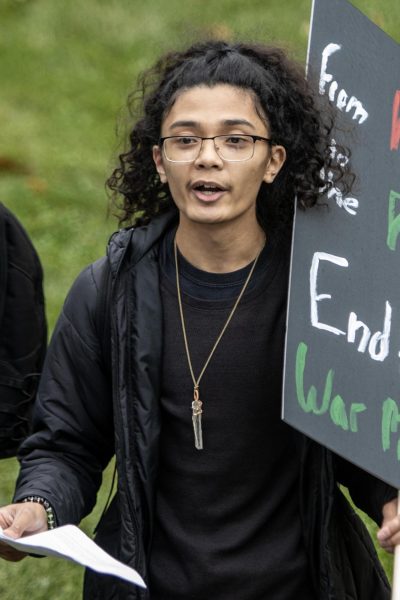
Eastern hosts over 150 Resident Student Organizations (RSOs) on campus, but one glaring issue haunts every organization: the problem of gaining and retaining members.
RSOs are truly a reflection of all that goes on around campus between work and after classes, offering a variety of academic, social, political, multicultural, Greek, service and religious groups.
These organizations regularly provide students the chance to try something new, expand their horizons and showcase their interests. Yet, it is easy for so many RSOs and their leadership to forget what exactly students are looking for in an RSO.
What peaks students’ interests and what encourages them to come out to a meeting? And more so, what can RSO leadership do to meet these demands and keep prospective members coming back?
The consensus from staff, admins and students is that if RSOs want to survive and thrive, they must keep community and belonging at the center of their mission.
According to graduate student and admissions assistant Luis Paniagua, students are often looking for a “home away from home.” Students want to feel a sense of belonging and familiarity in the organizations they attend.
Students want an organization they identify with. Here lies the value of identity-based groups on campus. For example, young students of color may have difficulty processing the culture shock of attending a predominantly white institution (PWI) for the first time.
Multicultural organizations therefore function not only as groups to celebrate cultural diversity but as a space to process these experiences within a community. These RSOs act as a network for marginalized and minority groups to connect with each other, validate their identities and amplify their voices.
Look no further than the historic rise of Black student unions in the 1960s. These student-led organizations sprouted out of the Black Power and Black Freedom movements and centered the needs and interests of Black students on campuses across the country.
More than emphasizing a sense of belonging, such organizations practice and preach self-determination for their respective communities taking the form of advocacy, organization and mobilization on social-political issues.
These same principles of familiarity and solidarity apply to faith-based RSOs that provide a sense of community in shared beliefs, practices and worship. Even academic, political, social, Greek and service RSOs bolster a deep sense of community when they organize and get involved along activities and missions of shared interests.
Every organization in their own way strives towards providing a sense of community and identity with their membership but arguably, those most rooted in their community do the best.
Thus, RSO leadership and organizers bear the responsibility of nurturing these communities. Fundamentally, RSO leadership needs to be in tune to the interests of their members.
They are, after all, elected by their communities and consequently act as elected representatives. Leaders must find out what types of events current members and attendees enjoy. Every semester and every group will be different!
Some members will enjoy game nights, competitions, outdoor events, bowling, crafts, paintings, movies and, in general, favor social events. Other groups may prefer educational events like presentations, guest speakers, lectures, workshops, discussions and debates.
More hands-on groups may prioritize volunteer work, mutual aid projects, voter registration drives or political rallies and demonstrations. Ultimately, any well-rounded RSO will incorporate a healthy combination of events and activities but they must always stay grounded in the interests of their membership.
Gauging the interests of the current membership will also help RSOs “sell” their organization to a broader student population. Here are a couple recipes for success some student leaders on campus have suggested:
● Meet at consistent times and locations. This will help members fall quickly into a routine.
● Get good at Canva and/or digital design. A good poster should capture the viewer.
● Keep good records of attendance. If your RSO can provide accurate numbers it will help gauge what works well for your group, identify areas of improvement and aid in securing larger projects in the future if you can demonstrate membership growth.
● Collaborate with other RSOs! Not only do collaborative events mix things up, they bolster a larger community on campus.
However, with so many RSOs to choose from, it is fair to say that Eastern students are constantly inundated by different organizations competing for their attention and attendance and are reasonably burnt out by the snafus of it all.
I, myself, make weekly decisions between which RSO events I attend and easily find myself overbooked. Perhaps, we have spread ourselves too thin in the “RSO economy” and have constructed a model of student engagement in which RSOs, instead of cooperating, compete against each other for student attendance and membership.
In this limited academic and social calendar, does “the more the merrier” still apply? Maybe in our attempts to create a space for everyone we have ironically become more separated and isolated within our groups and activities.
Academic and activist Marc Lamont Hill in his speech at the annual Dr. Martin Luther King, Jr. celebration at the Faith Community of St. Sabina said in his critique of young organizers, “Everybody wants to lead an organization, but nobody wants to join one.”
We are social animals by nature. Yet, the world we find ourselves in today manufactures isolation in our high consumption of social media, lack of communal “third-spaces” and our culture of hyper-individualism.
RSOs are one avenue of combating the loneliness encouraged by our environment, and this is especially true for many who are currently away from home. Campus RSOs can offer space outside of work, home, and school.
If you are a student unaffiliated with an organization, get organized! If you are currently in an organization, join a leadership position. If you are in a leadership position, listen to the needs of your community.
As we navigate this stage in our life as a student, we will face challenges that are bound to be complex, multifaceted and different depending on our personality and situation.
Ultimately, we do best when we feel safe and secure in the company of people we enjoy. Perhaps even here you can discover a sense of home and find your people.
Jason Farias can be reached at [email protected] or 217-581-2812.












































